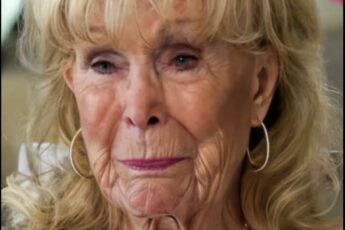Lately, Pavel couldn’t be around his wife. He didn’t recognize her. Instead of the bright, cheerful Polina, with whom he had lived for almost ten years, there was some other woman nearby – pale, quiet, tired. She cried more and more often for no reason. More and more often, when it was necessary to calm the children down, she would yell at them, and then apologize, justifying herself: “I’m just tired, forgive me.”
Pavel tolerated it at first. Well, really, you never know what happens. And then he began to distance himself.

Tonight was very important to him. Dinner with potential partners, people he had been trying to arrange a meeting with for over a month. Polina knew how important it was to him. He had even picked out her dress himself, one she hadn’t worn in a long time. Dark blue, form-fitting. She had once looked gorgeous in it. And yet now, even in this dress, she looked lost.
They reached the restaurant quite calmly. Pavel got out first, straightened his shirt collar, and looked back at his wife. But she was looking somewhere into the void.
“Polina, are you coming?!” he said over his shoulder. “We’re already late.”
“Wait…” She stopped at the steps, staggered, and grabbed the railing. “Sorry, my head is spinning…”
He turned. Her face became even paler. She closed her eyes, as if in sharp pain. And then he broke down.
– What the hell?! – Pavel barked. – Are you serious?! Right now?! Are you going to ruin everything?!
“I didn’t do it on purpose…” she whispered, without looking up at her husband.
– Not on purpose?! This is already a cycle! You always have something – tired, not yourself, can’t, don’t want to… How much longer can this go on, Polina?! You’re simply sabotaging my life! And today, my work too! Do you even understand what this looks like?
Polina looked at her husband in confusion. He was furious. And she couldn’t get anything out of herself:
– I just don’t feel well…
– Then go home. Just get out of my sight! I don’t need a circus during a meeting right now. Thanks for trying!
The husband turned away and walked inside. He didn’t look back. And Polina remained standing below.
The dinner went as it should. Pavel was polite with his future partners, joked in moderation, set traps and lured them with promises. The deal was in his hands.
Now the man stood in front of his apartment door and couldn’t ring the bell. He had a phone in his pants pocket, but he didn’t take it out. He just stood there, looking at the door.
He remembered that Polina had once been different… She had been an ideal wife, a wonderful mother. Now Pavel had no explanation for her metamorphoses.
“So what should we do now?” he whispered to himself.
There was a pain in his chest. He was afraid to go in, not because he was threatened with a scandal. Pavel knew that Polina would remain silent. He was afraid that she really was ill. That everything was more serious than he wanted to admit.
Pavel became more and more confused in his feelings.
He tried not to be angry with Polina, to control himself. But it was becoming increasingly difficult. She had changed – and he saw it every day. Weak, tired, irritated. She constantly asked for forgiveness, but it seemed to him that it was much easier not to behave like that. And what was worst of all – he began to feel hatred towards his wife. Sometimes he just wanted to leave, slam the door and never come back.
He knew it wasn’t right. That it shouldn’t be like this. And yet, he couldn’t cope with it.
He decided to talk to his brother. He was always calmer, more reasonable. He could give advice. They met in the evening. Pavel was silent for a long time, then exhaled:
— I don’t know what’s wrong with me. I can’t be around her anymore. Everything irritates me. Her voice, her appearance, the way she walks around the house, the way she talks to the kids… It’s like I’m burning up inside. Is this normal?
————————————–
The brother didn’t say anything for a long time, he just looked at him. And in that look Pavel suddenly saw something strange. As if he knew something else.
“You’re judging me now, aren’t you?” Pavel asked sharply. “You can tell by your eyes.”
“No, no,” the brother shook his head. “That’s not the point.”
– What then?
He was silent for a moment, and then quietly said:
– Talk to Polina. Seriously. It’s not my secret. I didn’t want to know it at all, it just happened.
– What other secret? Did she tell you something? And not me?
– She didn’t tell me anything, Pasha. It turned out that I was an accidental witness and I shouldn’t get involved, forgive me. Talk to her yourself. But calmly. No claims. Just talk.
– Just give me a hint. Is this a disease?
The brother stood up from the table, was silent for a moment and added:
– Just talk to your wife. And you will understand everything.
For the first time in a long time, Pavel felt something different – not anger or fatigue. Most likely, it was fear.
That same evening, Pavel finally decided to talk to Polina.
They were sitting in the kitchen. The children were sleeping. The house was quiet. He twirled the mug in his hands for a long time, then looked at it and spoke, trying to be calm:
— I wanted to apologize. For that evening when we went to the restaurant. I was unfair. And rude. I’m ashamed.
Polina nodded without looking up. She looked incredibly tired. There were dark circles under her eyes, her lips were dry, her shoulders were slumped.
“I noticed something was happening to you,” he continued. “You were different. I didn’t understand. I was angry. I’m sorry. But now I want to understand what’s happening to you. Really. You can trust me.”
Polina took a slow breath. She was silent. As if gathering her courage.
“I haven’t been feeling well for a long time,” she said quietly. “At first I just thought I was tired. It happens. I worked too hard, didn’t get enough sleep… But it got worse. Everything required incredible effort – waking up, going to work, making breakfast for the kids. Even just getting dressed was a feat.”
She looked up at him, her eyes filled with incredible longing.
— I tried to ignore it. To convince myself that it would all pass. Then I went to a psychologist. He tried to help me. But it seems that even he himself did not understand what was wrong with me. He said that it could be depression. I tried to change something. But nothing worked.
Pavel listened with bated breath. He didn’t interrupt. For the first time in a long time, he simply listened.
– After the restaurant, – Polina continued, – I went to see a therapist. This is not the first time I have felt ill. My head is spinning, I feel weak, sometimes I almost lose consciousness. I took tests. And they told me that there is a suspicion of leukemia.
A terrible silence fell over the room. Pavel’s eyes darkened. Everything that had been before – irritation, resentment, fatigue – disappeared in one second. Only she remained. Her voice. Her eyes.
He sat closer. He extended his hand. He touched her fingers. His wife’s hands were cold.
“Polya…” he whispered. “Why didn’t you tell me right away?”
“I didn’t want to believe it myself,” she answered. “I needed time… I was afraid. I’m still afraid. I was afraid that I would make you angry. Or disdainful… I don’t even know…”
– How did my brother find out?
– His new passion works in that clinic… We ran into each other by chance…
His breath caught. He suddenly understood clearly: everything he was afraid of – everyday life, boredom, a “different” wife – was nothing compared to real fear. Fear of losing her.
Everything inside him tightened. For the first time in a long time, he felt not irritation, but pain. Real pain.
“I’m with you,” he said. “Until the end. Whatever it is. Just tell me what you need. And I’ll do it. I’m ready for anything.”
Polina looked at him. And for the first time in a long time, something alive flashed in her eyes.
From that day on, everything changed.
It was as if Pavel had woken up from some strange dream. Previously, he had thought that being close meant simply living under the same roof, sharing the household chores, and bringing his wife a salary. But now he knew: being close meant holding her hand when it was scary, when it was bad, when there was no strength left. And he began to fight for Polina.
“Tomorrow we’ll go to a good doctor, I made an appointment for ten,” he said one morning, serving her breakfast. “He’s the one my friends recommended. He’s smart.”
“Did you do it all by yourself?” Polina looked up at him in surprise.
– Of course. Don’t worry. We’ll do everything. Everything will be fine! I’m here!
He drove her to appointments, to check-ups, to chemotherapy. He sat in the hallways, cheering her up while she lay on a drip. Sometimes he just held her hand. Sometimes he chatted about everything. He took the children on himself, asked his mother to help with the grandchildren.
“Remember how we missed the train on the third day after the wedding?” he grinned, adjusting the blanket on her shoulders.
– Yes, and then you carried the suitcase for three kilometers.
– Well, at least not you. Although you are lighter than that suitcase.
“Then yes,” she smiled sadly. “But now, I think I’m a little overweight.”
He immediately frowned and pressed her fingers to his lips.
– You always have the perfect weight! And I love you, Polya. Very much.
Every morning he woke up a little earlier just to look at her. At how she slept. At her face, tired, but so familiar to the point of pain. And only after this small ritual, he began his day.
He made little surprises for his wife. Sometimes flowers for no reason, sometimes a note under her pillow. Sometimes he brought a beautiful breakfast on a tray, as if they were in the most expensive hotel in the world! True, she ate almost nothing, but she always thanked him. Sincerely and with great love.
“Are you crazy, Pash? We’re saving money,” she said, seeing a huge bouquet in the room.
“On anything but you,” he joked.
They had been through it all. Weakness, sleepless nights, tears. Breakdowns. Silence. Endless rejection of food and medicine. Sometimes it seemed like there was no hope.
And so they sit in the doctor’s office. He says calmly:
– You’re in remission. That’s good news.
Pavel heard these words, but they seemed to pass through him. Because he was looking at Polina. And she was looking at him.
“Did you hear?” she whispered. “It means I’m going to live!”
He nodded. He didn’t know what else to do. He just started kissing her hands.
– Yes, Polya. We’re just getting started! We did it.
Pavel and Polina lived a happy life.
Many years later, in a very similar office, Polina was already holding Pavel’s hand tightly.
He sat in the chair, leaning against the back, slightly slouched. The illness was slowly erasing faces, events, names from his memory. The world was becoming blurry. But he still recognized her face.
Polina was sitting next to him. She held his hand tightly. They had truly lived a long life together. With all its difficulties, joys, turning points. Everything that once seemed like the end turned out to be just the beginning.
Now the disease was taking away Pavel’s most valuable asset – his memory. But even in this precarious state, he looked for Polina with his eyes, and when he found her, he calmed down. He held on to her, to her voice, to her touch, to the last fragments of their shared memory.
He didn’t always know what day it was. Sometimes he couldn’t immediately remember where he was. But when he looked at her, he recognized her.
“You’re here…” he whispered.
“I’m with you,” she answered. “Always.”






